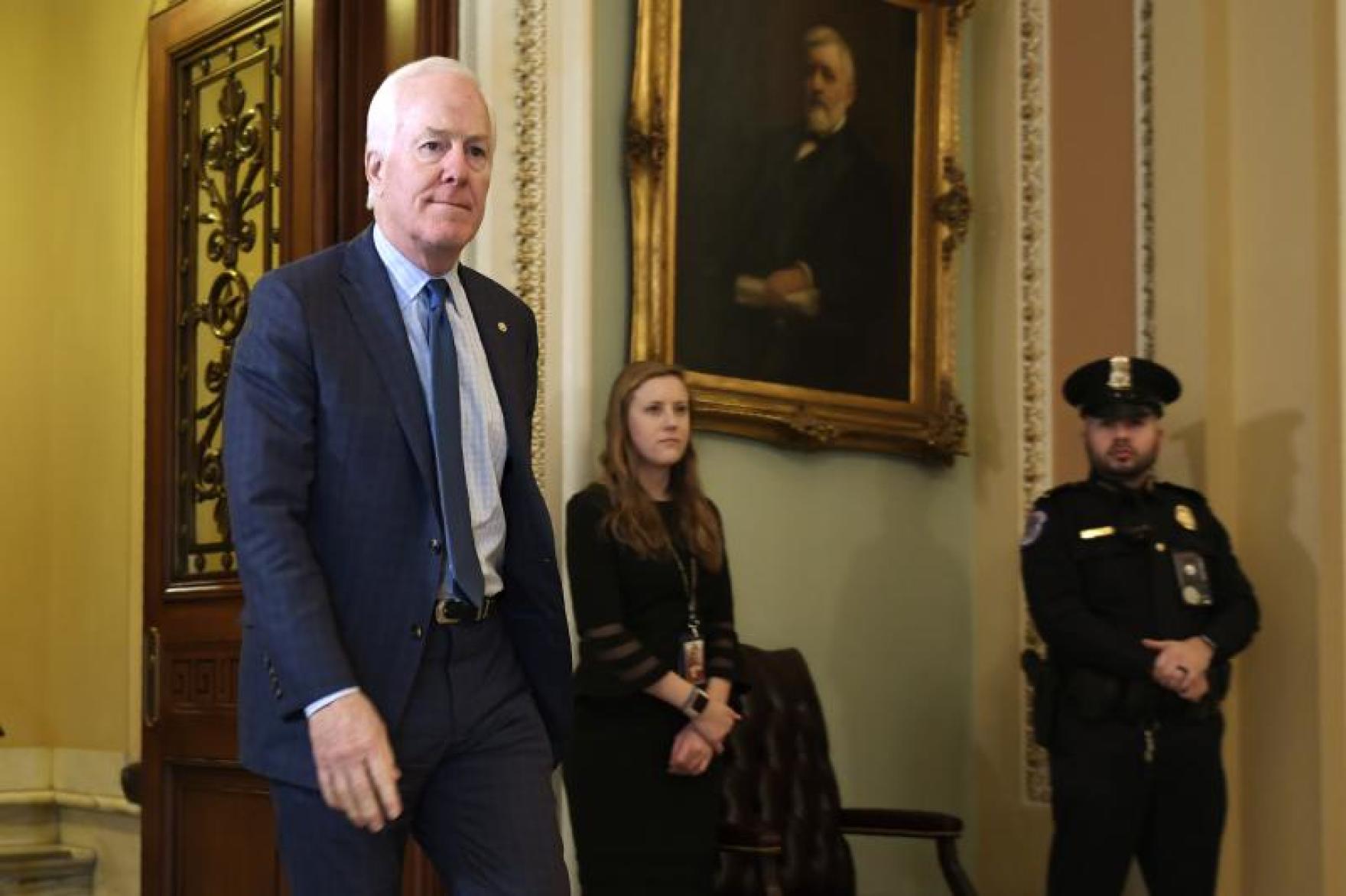From KERA:
Texas’ U.S. Senate race pits Air Force veteran M.J. Hegar, a Democrat, against the incumbent, Republican John Cornyn.
Cornyn has been in office for almost 18 years, and yet a recent University of Texas poll found about a quarter of registered voters were either neutral on his job performance or had no opinion.
Each of the nation’s 100 U.S. Senators is a person with substantial power to affect government policy and make choices with very high stakes.
So, what has John Cornyn done with that power? Here’s a look at four major areas.
1. Prison reform
In late 2018, after a divisive midterm election, Republicans and Democrats in the Senate passed a rare bipartisan bill. In broad terms, it eased mandatory minimum sentences for some federal crimes, including nonviolent drug charges. It also reformed prison practices to improve rehabilitation. The reforms are often described as modest.
“These were seen as general best practices in the field,” said Derek Cohen, who worked on the bill as a policy director for criminal justice reform at the conservative think tank Texas Public Policy Foundation. “And for that reason they were generally less controversial both within the GOP [and] I’d say within the population generally.”
Cornyn had worked on the prison reform parts of the law in some form since 2013. He took his cues from Texas, Cohen said, where many of the policies had been in practice for years.
“He has a very pronounced focus on making sure that the final product is right, that it’s correct. That it’s not building the plane as it flies, as it were,” Cohen said.
There was some last minute drama over vote counting, but President Trump signed the First Step Act that December.
It was an example of the problem-solving Sean Theriault said Cornyn is known for.
“In today’s Senate, where we have a whole lot of people who like to use really strong rhetoric and burn down the house, I think of John Cornyn as one of these people who does care about solving problems,” said Theriault, a professor at the University of Texas at Austin and an expert on Congress.
On at least two other major issues, however, Cornyn has critics who don’t see him as a problem-solver at all.
2. Judicial nominations
One is filling the federal bench with very conservative judges. Senators traditionally have input over appointments in their states.
Cornyn and his fellow Texas Senator, Ted Cruz, have worked quickly in the Trump era to fill judicial vacancies in Texas.
“We know that this is one of the main reasons President Trump was elected over Hillary Clinton in the first place,” said Cornyn at a press conference in 2017. “Because of the importance of these nominees and the service of these judges from the Supreme Court, down to the Court of Appeals down to the District Court.”
But Christopher Kang, who worked on vetting judicial nominees in the Obama White House, said working with Cornyn on finding judges was “hit and miss,” and that 13 vacancies existed at the end of the Obama presidency because Cornyn and Cruz wouldn’t compromise. Some of those vacancies were three or four years old, Kang said.
“I think that Senator Cornyn was more than happy to try to run out the clock and see what would happen in the election,” said Kang, who is now chief counsel at the progressive group Demand Justice. “And then, as we saw, when President Trump won he rushed very quickly to fill all of those vacancies that he had helped keep open for years.”
Cornyn has long influenced which judges sit on the federal bench in Texas. He worked with the Bush Administration to appoint Reed O’Connor, the judge who threw out the entire Affordable Care Act in 2018. O’Connor used to work for Cornyn.
“I’ve seen first-hand his strength of character, professional integrity and commitment to fairness and the rule of law,” said Cornyn after his confirmation in 2007. “Without question, Reed O’Connor will make an outstanding federal judge.”
If the Supreme Court were to uphold O’Connor’s ruling, it would have widespread implications for the nation’s health care system and people’s access to health insurance. It’s on the court’s docket this fall.
“The reason we’re here is because Sen. Cornyn’s former staffer, Reed O’Connor, set us on this trajectory,” Kang said. “I think that it’s important to recognize how much influence he’s had on our courts, not only in Texas but the impact now, nationwide.”
3. Immigration
Yet another area where Cornyn has influence in the Senate – and a long record – is immigration. He holds sway as a conservative Republican from a border state, and sits on the subcommittee on Border Security and Immigration.
Bipartisan comprehensive immigration reform has had a few high-profile near-misses since Cornyn has been in office.
“We need to go back to listen to our constituents. We need to talk to them and explain to them what the problem is,” said Cornyn on the Senate floor after a 2007 effort failed. “We need to have a transparent process that’s an interactive process, where we can listen to them and we can tell them what we’ve learned about this issue and about some of the problems and try to come up with a solution.”
But Cornyn’s talk of finding solutions sounded disingenuous to Frank Sharry, who runs the nonprofit America’s Voice and has spent decades working on immigration reform.
Sharry pointed out Cornyn has consistently voted against major bipartisan deals, even those taking a conservative approach. Sharry said Cornyn has a reputation in the Senate for undermining immigration dealmaking whenever lawmakers get close, for example by proposing poison pill amendments.
“There’s always a deal space, or a sweet spot,” Sharry said. “He would make sure he was outside of that space, pretend like he wanted it, go back to Texas and make beautiful speeches about how he was fighting for immigration reform, while in Washington he was making sure to pull the rug out from those who were actually serious about getting it done.”
Cornyn did vote for a White House-backed amendment in 2018 that would have created a citizenship pathway for some immigrants who came to the U.S. as children. That amendment also would have drastically curtailed legal immigration. The amendment failed 39-60, getting the votes of just three Democrats.
The Cornyn campaign told KERA he wasn’t available for an interview for this story.
Sean Theriault at the University of Texas at Austin considers Cornyn to be influential on immigration reform, part of a second rung of senators who worked on a bill in 2013.
“People say that he dropped out of the conversations. He would say that he was pushed out of the conversations,” Theriault said.
4. GOP leadership
Aside from his policy decisions, Cornyn has used his 18 years in the Senate to ascend to the No. 2 position among Republicans. That ended after the last election due to term limits.
Cornyn has said he’d like to succeed Mtich McConnell of Kentucky as the top leader of Senate Republicans. And that may yet happen. Theriault called Cornyn a “bridge-builder” among Republicans, bringing together the business friendly wing of the party and the hard-right Tea Party faction.
Cornyn was also chair of the National Republican Senatorial Committee for the 2010 and 2012 campaign cycles. In that role, his job was to raise money and help his party win.
“It really helps you with your colleagues, especially colleagues that really rely heavily on the NRSC to win open seats and to unseat incumbents,” said Carlos Algara at the University of Texas at El Paso.
Now, that same NRSC is helping John Cornyn in his contest for a fourth Senate term.














